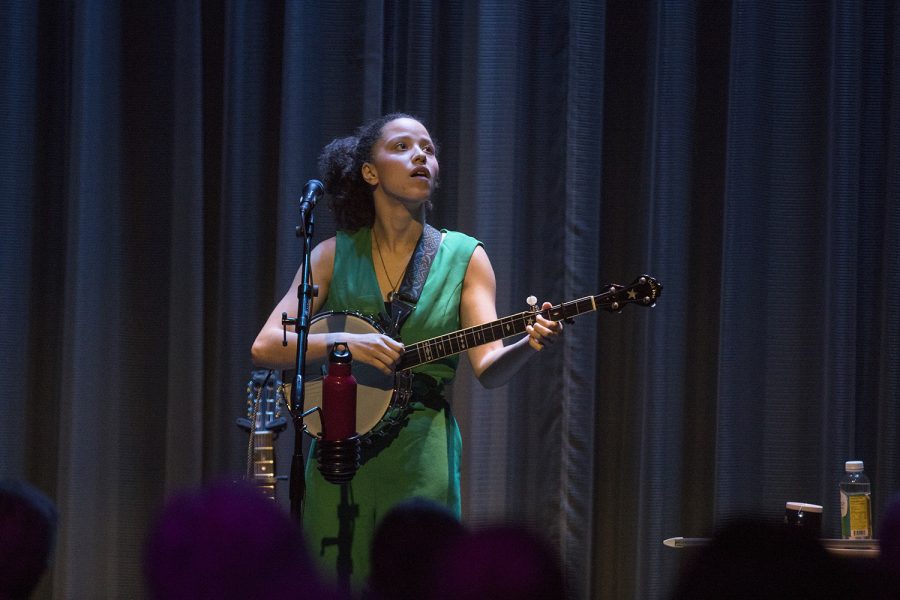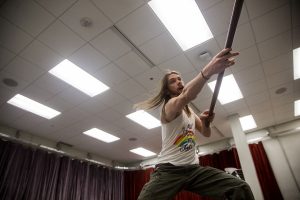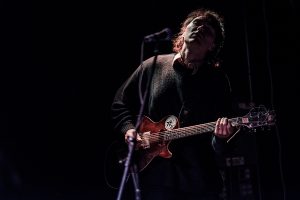Kaia Kater brings passion, personal stories to Hancher
Through her show, the Canadian banjo player shared a deeply personal story of her father’s experience as a refugee.
Kaia Kater performs in Hancher Auditorium on March 30, 2019. Kater is a singer-songwriter who has been nominated for a Juno award for contemporary roots album of the year.
March 31, 2019
One bass, one guitar, three lovely voices, and a banjo: This is how to put on a lovely, intimate, Saturday night show. Only Canadian banjo player Kaia Kater could pull this off with such grace.
Performing with bass player Andrew Ryan and guitarist Daniel Rougeau, Kater lit up Hancher’s Strauss Hall on March 30. She put on two performances, at 6:30 and 9 p.m., and though they were fairly short at a little over an hour each, each was memorable.
She wore an elegant green sleeveless dress and sang with a soothing, deep alto voice. She held her banjo as delicately as if it were made of gold. In fact, with the shiny silver lining and matte-black finish, her trademark instrument seemed to be the brightest piece of equipment on stage. She took sips of tea from a mug between songs, which was fitting for the cozy show.
The best parts of her songs were when the bass player and guitarist joined in on the vocals, and their voices meshed to create perfect harmony.
Kater sang songs from her latest album Grenades, which came out in October 2018. This album, she said, was inspired by her father’s time as a 16-year-old refugee from Grenada, a small island country in the Caribbean.
She described the political turmoil in Grenada, saying, “We’re gonna roll the clocks back to 1979.”
Between songs, there were audio clips of her father describing his experience and journey going from Grenada to Canada and audio clips of news broadcasts from that time. Kater brought the audience through every decade of Grenada’s history. This personal connection made her performance so much more moving and emotionally stirring, with many tear-jerk moments throughout.
RELATED: Dawes brings warmth to a snowy night at the Englert
Despite the heavy subject of her show, Kater maintained a bright and contagious smile throughout the show; it was obvious that she was enjoying herself on stage. This aspect of her show could be seen in her song “La Misère,” a definite standout piece. Though very short, the upbeat nature of “La Misère” (or “misery” in French) made it one of the best. This contrast between the extremely personal and more upbeat songs was very effective in hitting the right beats to draw out emotion from the audience.
“La Misère” also featured Ryan and Rougeau singing into the same microphone as Kater, bobbing together with the rhythm. The harmony of their three voices was especially melodic during the song.
Halfway through the show, Kater switched to an acoustic guitar, which brought even more amazing sound into Strauss Hall. Other times, she dropped her instrument completely and kept her hands out in front of her as she sang. She had her palms up and eyes closed, bringing the whole audience into her own space with her pure alto tone. She got more passionate the further into a song she reached, moving her head and arms because her feelings were too powerful to be expressed through only words.
She finished her show — and her father’s story — with a song that explained the “loss of sense of self” and the opportunities taken away from individuals living in a war zone. At the beginning of her show, she talked about the political turmoil and violence in her father’s home country, but she also talked about her experience recently visiting there. She described pineapples, avocados, and bananas growing there and noted the beauty of the island.
With lyrics such as “sometimes I feel like living, sometimes I feel like dying,” Kater’s show provided light on both the bad and the good of her father’s experiences and related them to life as well.






